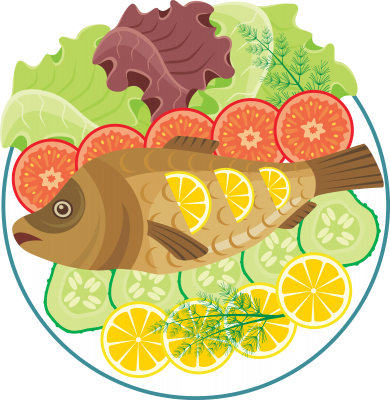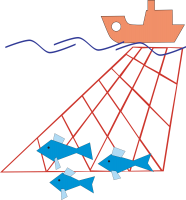Content may contain advertising or affiliate links.
To put it simply, a pescatarian is someone who follows a vegetarian diet but also includes fish and other seafood in their meals. This means that pescatarians abstain from consuming meat, such as poultry, beef, pork, or lamb, but they do eat fish and other aquatic creatures like shrimp, lobster, and scallops. Some pescatarians may also include dairy products and eggs in their diet, while others may choose to exclude them.

Concept
People who choose a pescatarian diet do so for many different reasons. Some may add fish into a vegetarian diet for its heart-health benefits, while others seek to minimize environmental impact, or simply prefer eating this way. And sometimes it comes down to taste!
Consuming a pescatarian diet may provide many health advantages, including reduced risks of obesity and chronic illnesses, such as cardiovascular disease and diabetes. Furthermore, this diet’s abundance of fiber, protein and omega-3 fatty acids may assist people in maintaining a healthy weight.
Pescatarian diets do present certain challenges. Iron deficiency may become an issue without meat or dairy products in your diet. To address this, be sure to include plenty of iron-rich foods like whole grains, dark green vegetables and nuts in your daily meals.
Reasons
The decision to adopt a pescatarian lifestyle can stem from various reasons. For some, it is a way to reduce their environmental impact. It is well-known that the meat industry contributes significantly to greenhouse gas emissions, deforestation, and water pollution. By eliminating meat from their diet and opting for fish instead, pescatarians aim to reduce their carbon footprint and support more sustainable food choices.
Pescatarian diets are rich in beneficial fats that can lower cholesterol and risk of cardiovascular disease, while also being full of vitamins and minerals such as Vitamin D and potassium, two key elements to prevent cancer and protect eyesight against age-related macular degeneration.
Fish and seafood are excellent sources of omega-3 fatty acids, which are known to promote heart health, reduce inflammation, and support brain function. By including fish in their diet, pescatarians can reap these nutritional benefits, while still following a predominantly plant-based eating pattern.
Additionally, some individuals may find it easier to transition to a pescatarian diet compared to a fully vegetarian or vegan lifestyle. Fish and seafood offer a wider variety of flavors and textures, which can make the transition more enjoyable for those accustomed to a meat-centric diet. This flexibility can also make it easier for pescatarians to dine out or attend social gatherings, without feeling restricted in their food choices.

Implementation
Pescatarian diets are an excellent way to enhance health. Pescatarian eating plans contain high concentrations of protein and omega-3 fatty acids, both linked with lower rates of heart disease, while eliminating meat reduces saturated fat intake substantially.
Reducing meat intake requires some adjustments. However, fish and shellfish are typically easy to prepare and a great addition to a vegetarian diet. Begin slowly by including two or three seafood-based meals into your weekly schedule. Consider beginning with simple recipes before moving up to more complex ones later.
Fish and seafood can be prepared in a variety of ways. This food source can be easily incorporated into soup, stews and salads. Grilling and baking would be the most healthy way of preparation.
It’s worth noting that being a pescatarian does come with some considerations. Sustainability is crucial when choosing seafood, as overfishing and destructive fishing practices can harm marine ecosystems. Pescatarians should prioritize consuming fish that are responsibly sourced and harvested. Additionally, individuals with certain dietary restrictions or allergies should be mindful of potential issues related to seafood consumption.
Mercury contamination can be a concern to pregnant women, and those with chronic illness. To reduce the risk, always opt for wild caught, small, cold water fatty fish. Sardines would be an ideal choice.
In conclusion, a pescatarian is someone who follows a vegetarian diet but includes fish and other seafood in their meals. This dietary choice can be driven by environmental concerns, health benefits, or personal preferences. By making conscious seafood choices and ensuring a well-balanced diet, pescatarians can enjoy the best of both worlds, a plant-based lifestyle with the added nutritional benefits of fish and seafood.
